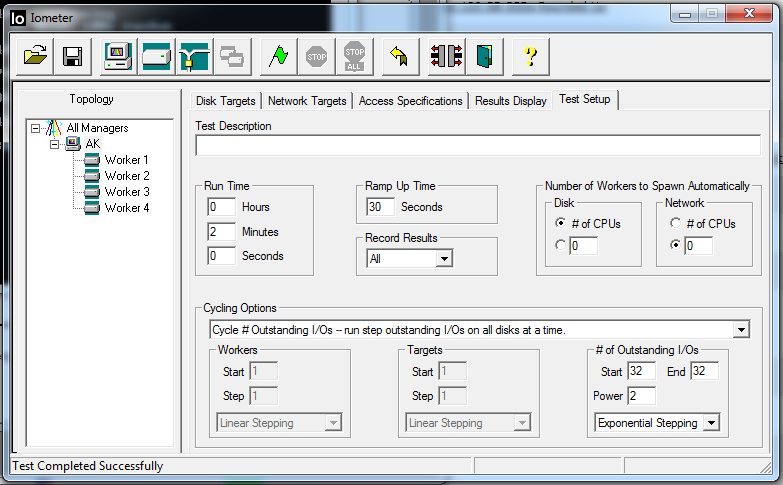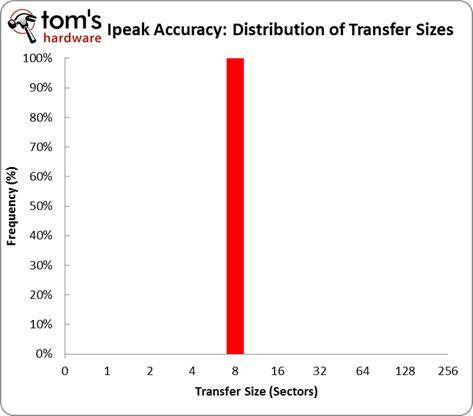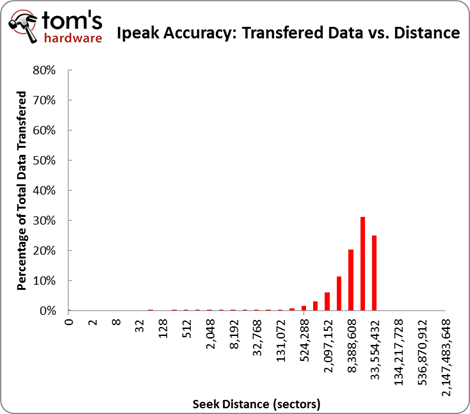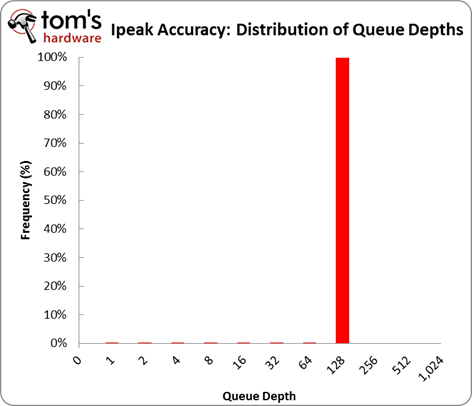SSD Performance In Crysis 2, World Of Warcraft, And Civilization V
Is A Trace-Based Analysis Accurate?
We’re using a trace-gathering tool sourced from Intel to analyze the storage pattern of games. IPEAK is trace-based, which means it records the I/O commands issued at the operating system level.
But how accurate is using a trace? Actually, it's pretty damn good. Look at our results when we trace Iometer during a benchmark session with the following settings:
- # logical cores = workers
- QD=32
- 4 KB transfer size
- 4 KB align
- Fully random
IPEAK: Trace Accuracy
When we look at the trace captured from Iometer, we see that 100% of all accesses are eight sectors in size. This matches exactly the 4 KB setting we specified in Iometer (512 bytes per sector, yielding 4 KB).
Remember that sequential transfers incur zero seek distance. This graph confirms that IPEAK is correctly recording operations, as all the data is random.
This graph is interesting because all of the operations in our captured trace are queued 128-deep. That isn’t a mistake. We set Iometer to run with four workers on our Core i5-2500K, mimicking the workload you'd see from a threaded application issuing concurrent commands. Each worker runs independently, which means that queue depths stack up. That’s why our captured trace reflects the queue depth it's reflecting, despite the fact that we set Iometer to push a queue depth of 32.
We're happy to report that IPEAK-based measurements are extremely accurate, which is why it’s one of our favorite tools for storage evaluation.
Get Tom's Hardware's best news and in-depth reviews, straight to your inbox.
Current page: Is A Trace-Based Analysis Accurate?
Prev Page Understanding Storage Performance Next Page Launching Crysis 2-
the_krasno If it doesn't improve FPS I don't see competitive gamers adding SSD's to their rigs for nothing but main OS drive.Reply
Longer loading times are not crucial when all you want is to frag your enemies! -
Soma42 This just confirmed what I knew already. I will probably upgrade to a SSD with my next build, but they are still so bloody expensive for the storage they offer. Plus, SSD are supposed to have better reliability compared to magnetic drives.Reply -
crewton I took WoW off my SSD for 2 reasons: space and performance. WoW is just way too big of a folder with addons and everything else it was around 35GB and like this article states the start and initial load is really the only benefit. Once you are in the world (of warcraft) it's not used.Reply
I'd like to see how the witcher stacks up with SSD. You are constantly having to load different areas the entire game so I made sure to have that on the SSD while playing it hoping to reduce the load times. Would like to see if that really paid off or not. -
Nnymrod It's all about the bottleneck, which isn't storage for actually playing a game. That said, SSDs are definitely cool, and I have one.Reply -
AlexIsAlex So it looks to me like game loading and level loading is not significantly hard-disk bound, if the disk is busy for such a short period of time. For example, loading a Crysis 2 level taking 58s, of which the disk is busy for 2.Reply
Does that mean if you had an infinitely fast disk, the level loading would take 56s? In which case, where is the bottleneck for level loading? Is it CPU bound? (if so, why isn't CPU usage at 100% when loading a level?) Memory? Graphics card? -
agnickolov There was supposed to be a comparison with a 1TB Barracuda, but nothing made it into the article itself. How hard could it be to display two adjacent bars on every graph instead of 1? E.g. red for the SSD and blue for the HDD.Reply -
celuloid Why don't we see how long are those loading times with HDD drive? Maybe we find out 2x faster loading is not worth 30x times more money per GB.Reply



